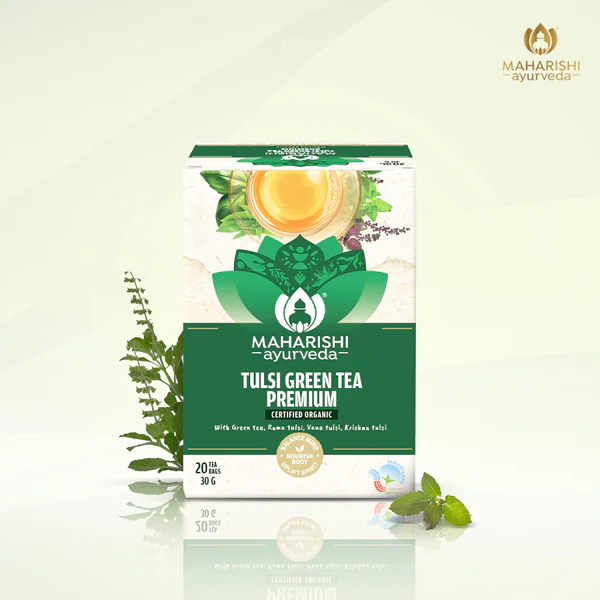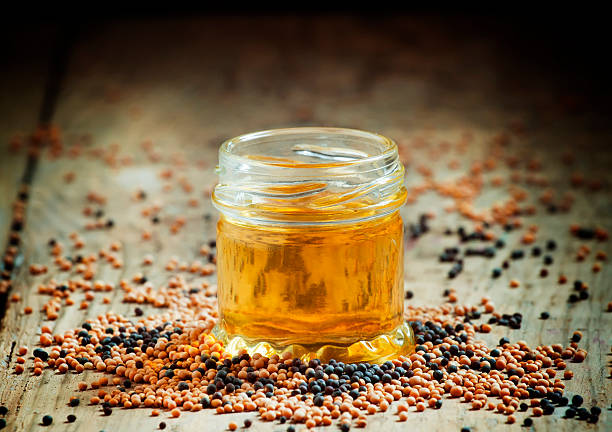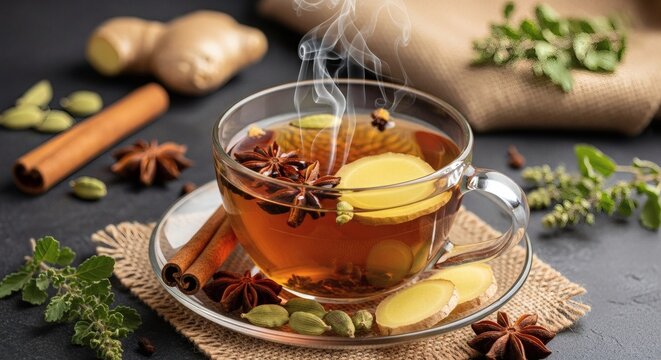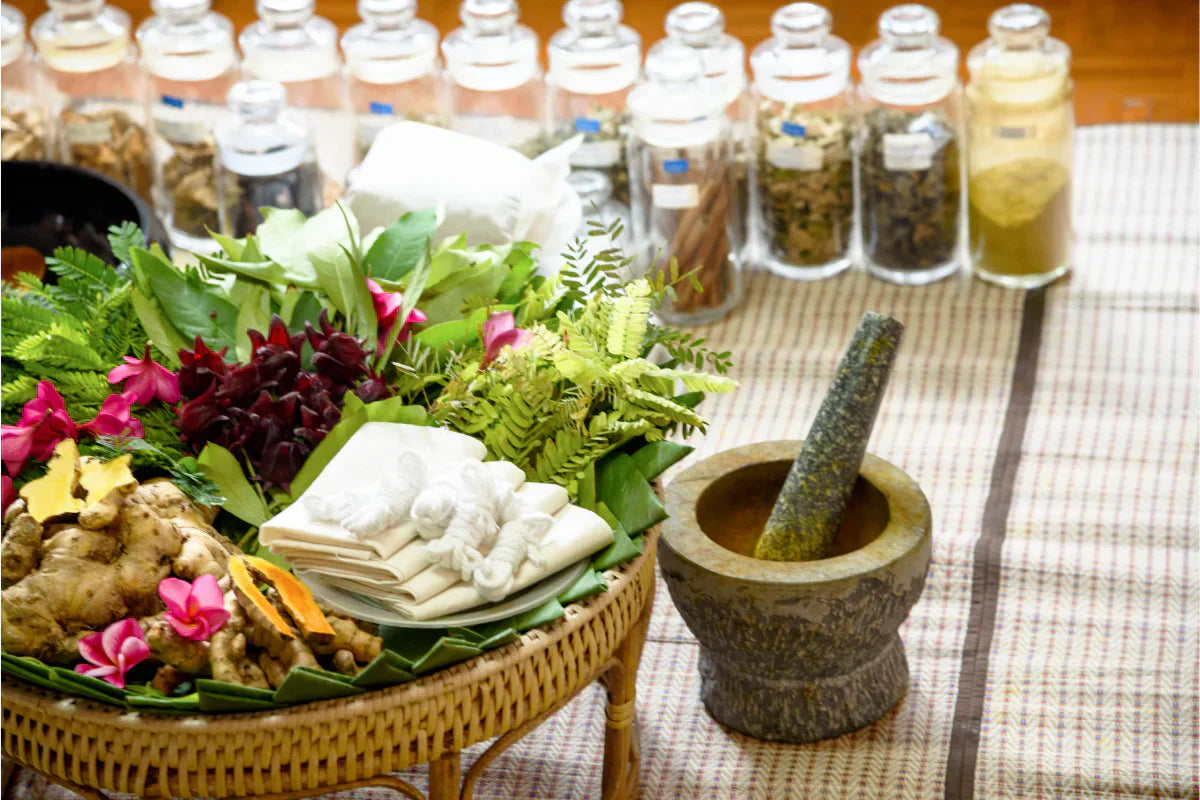What Are the Benefits of Tulsi? Uses and Side Effects Explained

Tulsi, known scientifically as Ocimum sanctum or Ocimum tenuiflorum, holds a revered place in Indian culture, both spiritually and medicinally. As described in Vedic texts and Ayurvedic scriptures, Tulsi is considered a manifestation of divine energy, revered as an embodiment of Goddess Lakshmi or Vrinda. Traditionally grown in courtyards and offered daily prayers, it is believed to purify the surroundings, uplift the spirit, and balance bodily energies.
TL;DR – Tulsi: The Sacred Herb with Powerful Healing Benefits
- Immunity & Respiratory Support: Tulsi boosts natural immunity and relieves cough, cold, and congestion especially Krishna Tulsi with its potent Eugenol content.
- Stress Relief & Mental Clarity: Acts as an adaptogen to help your body manage stress, calm the mind, and promote emotional well-being.
- Skin, Hair & Detox Benefits: Purifies blood, clears acne, reduces dandruff, and supports liver detoxification for a healthy glow inside out.
- Digestive & Metabolic Health: Aids digestion, reduces bloating, and helps regulate blood sugar ideal for gut and metabolic balance.
- Versatile Usage: Enjoy Tulsi as tea, powder, juice, or ark; apply topically for skin issues; or chew leaves fresh for daily wellness.
So, what exactly is the Tulsi plant?
In India, Tulsi is not a plant; it's sacred. It's ingrained in everyday life and the ancient Ayurveda system. It's a symbol of purity, devotion, and protection. Many families worship it, offering it water and prayer every day. There's a silent belief that having Tulsi near cleanses the air and the atmosphere, keeping bad vibes away. But this devotion isn't old-school alone. New eyes are slowly opening up to the actual, real health benefits of Tulsi, seeing what Ayurveda has known for centuries: this small pla\nt packs a serious punch for wellness. It's essential. But not all greens are equal.
Different Types of Tulsi

Just like people, Tulsi comes in different varieties, each with its own character and strengths. Knowing them helps you pick the right one for your needs. The main ones you’ll encounter are sorted by their looks:
- Safed (Rama) Tulsi: With bright green leaves and stems, this variant is milder in taste and is traditionally known for its cooling and skin-soothing properties.
- Shyama (Krishna) Tulsi: Recognised by its purplish leaves and dark stems, this is considered the most therapeutically potent. Due to its high concentration of Eugenol, it’s especially beneficial for respiratory conditions and immune system enhancement.
- Vana Tulsi: A more aromatic, bushy variant often found in forests. Though less commonly cultivated, it possesses adaptogenic and antioxidant-rich properties, supporting vitality and mental clarity.
Buy Now Tulsi Green Tea Premium with Rama, Krishna & Vana Tulsi for daily detox and balanced energy.
So, which type of Tulsi is best? It depends:
- For a general immunity boost, any type works well.
- If you're looking for respiratory relief, especially for coughs and congestion, Krishna Tulsi (also known as the black tulsi) is often favoured.
- For skin benefits or a milder daily tonic, Rama Tulsi is a popular choice.
What’s Inside? The Tulsi Nutrition Story
You don’t need a chemistry degree to appreciate Tulsi, but understanding why it works can be helpful. Its power comes from a clever mix of natural compounds:
- Essential Oils: These give Tulsi its distinctive scent. Key players include Eugenol (also found in cloves), which has warming and germ-fighting properties.
- Ursolic Acid: A triterpenoid compound supporting immune function and stress reduction.
- Rosmarinic Acid: A potent antioxidant that neutralises free radicals and supports cellular health.
- Vitamin C, A, and trace minerals: like calcium, iron, and copper, contribute to immunity, skin vitality, and oxygen transport.
This synergy of compounds—not commonly found in such high concentration in a single plant—makes Tulsi an unparalleled natural remedy.
The Top 10 Benefits of Tulsi Leaves

1. Boosts Immunity Naturally
Enhances white blood cell function, detoxifies the body, and combats bacterial, viral, and fungal threats. Rich in copper and antioxidants, Tulsi strengthens resilience naturally.
2. Effective Remedy for Cough and Cold
Tulsi pacifies Kapha and Vata, making it ideal for congestion, bronchitis, and asthma. A decoction with black pepper and cinnamon clears nasal blocks and soothes the throat.
3. Supports Respiratory Health
With antibacterial and anti-inflammatory properties, Tulsi helps manage acne, fungal infections, and pigmentation. DIY face packs using fresh Tulsi paste promote clearer, radiant skin.
4. Promotes Glowing and Clear Skin
The benefits of Tulsi for skin are well-regarded. Its anti-bacterial and anti-inflammatory properties make it helpful in tackling skin troubles like itching, minor fungal infections, or acne. A simple DIY Tulsi face pack: grind fresh leaves with a bit of water or rosewater into a paste. Apply to clean skin, leave for 10-15 minutes until dry, then rinse with cool water. Regular use can help manage breakouts and pigmentation, partly because Tulsi helps purify the blood.
5. Tulsi as a Stress Reliever (Adaptogen)
Modern life is stressful. Tulsi eating benefits include helping your body better handle stress. It’s classified as an adaptogen, meaning it helps normalise your body's stress responses, potentially balancing cortisol levels. A cup of Tulsi tea in the morning or evening can be a simple ritual to foster a calmer mind. In Ayurveda, it’s considered "Sattvic," promoting clarity and positive feelings.
6. Natural Detoxifier and Liver Cleanser
Our bodies are exposed to a significant amount of waste daily – pollution, processed food, and stress. Tulsi benefits include acting as a gentle detoxifier, helping your liver process and eliminate these toxins more effectively. Think of it as giving your internal filtration system a bit of support. This blood-purifying action is a key part of its traditional use.
7. Helps Control Blood Sugar Levels
Supports glucose metabolism, making it a valuable adjuvant in managing Type 2 diabetes. Always consult your physician before regular use.
8. Aids in Digestion and Gut Health
Feeling bloated or uncomfortable after meals? Tulsi benefits your digestive system. It can help reduce gas, bloating, and indigestion. In Ayurvedic terms, it stimulates digestion (Deepan), helps break down food (Pachan), and eases the movement of wind (Anuloman), reducing that uncomfortable fullness. This also supports a healthier environment for good gut bacteria.
9. Supports Oral and Dental Hygiene
Fancy a natural breath freshener? Chewing one or two fresh Tulsi leaves helps combat the bacteria that cause bad breath and gum issues. Its antimicrobial properties are strong. It’s no surprise you find Tulsi as an ingredient in some Ayurvedic toothpaste – it’s a traditional way to keep gums healthy and teeth cleaner.
10. Encourages Hair Growth and Scalp Health
Want healthier hair? Tulsi benefits for hair include strengthening the roots and improving blood flow to the scalp. Its antifungal properties also make it helpful in tackling dandruff. Applying a paste of Tulsi leaves to your scalp, or rinsing with Tulsi-infused water after washing, can contribute to a healthier environment for hair growth.
Beyond the Top Ten: Extra Bits of Goodness
- Fever Relief: Traditionally used, especially for fevers with chills (often linked to Vata-Kapha imbalance). A decoction made with Tulsi and black pepper may help lower the temperature. (Avoid in high Pitta/heat-dominant fevers).
- Fighting Fatigue: Tulsi seeds are sometimes used to help combat fatigue and naturally boost energy.
- Easing Earaches: A couple of drops of warm Tulsi leaf juice can sometimes soothe ear pain (ensure it's not too hot and the eardrum isn't perforated!).
-
Headache Relief: In Ayurvedic practice (
Nasya), Tulsi leaf extract applied as nasal drops is used for certain headaches.
How to Use Tulsi
You don't need complicated potions. Tulsi is wonderfully versatile:
- Fresh Leaves: The most straightforward way. Chew 1-5 leaves daily (morning is typical). Wash them first. Avoid consuming milk directly, as Ayurveda considers this combination unhelpful.
-
Tulsi Tea (Herbal Infusion): By far the most popular modern format. Steep fresh or dried leaves (about 1 tsp dried or 5–6 fresh leaves) in hot water for 5–10 minutes. Add a slice of ginger or a squeeze of lemon if you like. Soothing and beneficial any time of day. Tulsi honey can be a lovely natural sweetener for it.
- Tulsi Powder (Churna): Dried leaf powder (usually 1/4 to 1/2 tsp) can be mixed with warm water or honey.
- Tulsi Juice: Extract juice from fresh leaves (5-10 ml) and take with a bit of water.
- Tulsi Ark: This is a potent liquid extract derived from the distillation of Tulsi leaves. Think of it as capturing the essence of the plant. It’s used in tiny doses (typically 2-10 drops) mixed in water. Great for respiratory issues, Immunity, or stress, but best started under guidance if you're new to it.
- Tulsi Tablets: Supports respiratory wellness.1-2 tablets twice a day with water after a meal or as advised by the vaidya
-
Topical Use: A paste of fresh leaves applied to skin irritations, insect bites, or the scalp (for hair benefits) is traditional and practical.
A simple question that might arise in your mind is whether basil is the same as tulsi but in reality, it's not
Tulsi vs. Basil

Though Tulsi is often referred to as ‘Holy Basil’, it differs significantly from the culinary basil (Ocimum basilicum) used in Western kitchens. Tulsi (Ocimum sanctum) is a sattvic herb with high therapeutic value, widely revered in Ayurveda for its ability to balance Vata and Kapha, cleanse the mind, and enhance ojas.
While sweet basil has benefits—especially for digestive ease and menstrual comfort—it lacks Tulsi’s krimighna potency and spiritual significance.
- Tulsi (Holy Basil / Sacred Basil): Ocimum sanctum/tenuiflorum. Primarily valued for its medicinal and spiritual significance. Stronger, more complex flavour – often described as peppery, clove-like, sometimes slightly bitter. The focus is on health benefits.
- Culinary Basil (Sweet Basil, Thai Basil, etc.): Ocimum basilicum and others. Primarily grown for flavour in cooking. Generally sweeter, milder (like the classic Genovese basil), or with distinct notes like anise (Thai basil). While it has some health properties, it's not used medicinally in the same deep way as Tulsi. One key difference is that Sweet Basil has a sharper flavour and is sometimes used traditionally to ease menstrual discomfort, unlike Tulsi.
So, while they are cousins, Tulsi stands apart for its specific health focus and cultural importance.
Precautions and Who Should Avoid Tulsi
Tulsi is generally very safe for most people in normal food-like amounts (like tea or a few leaves). But it's sensible to know a few precautions:
- Pitta Imbalance: If you tend to run hot (prone to acidity, heartburn, skin rashes, and irritability), use Tulsi moderately, as its warming nature may aggravate this condition.
- Existing Gut Issues: Avoid Tulsi if you have active gastric irritation, ulcers, or severe hyperacidity.
- Pregnancy: While small amounts of tea are generally considered acceptable, high doses or concentrated supplements (such as Ark) are best avoided during pregnancy unless advised by a qualified healthcare practitioner. Always check with your midwife or doctor.
- Blood Thinners: Tulsi might have a mild blood-thinning effect. If you take prescribed blood-thinning medication (like warfarin), talk to your doctor before using Tulsi regularly or in concentrated forms.
- Surgery: It's often recommended to stop Tulsi supplements a couple of weeks before planned surgery due to its potential effect on bleeding.
Still Doubting? Consult: If you have any health conditions or are taking regular medication, it’s wise to chat with an Ayurvedic practitioner or your GP before making Tulsi a major daily supplement. Better safe than sorry.
Conclusion: Why Tulsi Should Be in Your Routine
Let's face it, life gets busy, particularly after 30. Having natural, easy ways to help you feel your best isn't about quick solutions; it's about common-sense habits. Tulsi provides precisely that. We've discussed the best 10 health advantages – from that essential immunity support and making it easier to breathe, to soothing your nerves and supporting your digestion. It's a natural detoxifier, beneficial for your skin and hair, and even helps regulate blood sugar. The elegance of Tulsi is its simplicity. It is surprisingly simple to grow a Tulsi plant at home (it prefers sun and well-draining soil). Keeping it around you grounds you in a little bit of nature and tradition. Pinching off a few leaves to add to your morning tea or simply caring for it becomes a small, quiet ritual. It's a reminder that true wellness often stems from these subtle, daily habits that draw on nature, rather than from pricey supplements or fleeting trends.
So why not give it a shot? Brew up a cup of Tulsi tea tonight. Check to see if that sense of calmness continues. This humble herb is a valuable addition to your daily health toolkit.
Breathe Easy with Nature – Shop Tulsi Tablets Now
FAQs
1. What are the main uses of Tulsi leaves daily?
Daily use of Tulsi leaves primarily helps support your immune system, aids digestion, promotes a calmer mind, fights common germs, and gently helps your body eliminate toxins. Think of it as a daily wellness tonic.
2. Can I safely eat raw Tulsi leaves every day?
Yes, eating 1-5 raw Tulsi leaves daily is generally safe and beneficial for most people. Wash them thoroughly first. A standard tip from Ayurveda is to avoid consuming them with milk (like chewing leaves while drinking milk), as this combination is thought to be unhelpful and potentially lead to minor imbalances with long-term use.
3. Is black Tulsi (Krishna Tulsi) better than green Tulsi?
Krishna Tulsi (the black or purple variety) is often considered to have a stronger concentration of certain beneficial compounds, particularly Eugenol. This gives it a more potent flavour and is why it's frequently recommended for respiratory issues and strong immune support. While all Tulsi types are beneficial, Krishna Tulsi is generally regarded as the most potent in terms of medicinal benefits.
4. What exactly is Tulsi Ark, and how do I use it?
Tulsi Ark is a concentrated liquid extract made by distilling fresh Tulsi leaves. It captures the essential oils and water-soluble active parts of the plant. It's considered strengthening (a Rasayana), helps balance Vata and Kapha (cold/air and earth/water energies), and gently stimulates Pitta (fire energy). It's used for respiratory troubles, low Immunity, digestion issues, stress, and skin concerns. Use it sparingly: typically 2-10 drops mixed into a small amount of water, once or twice a day. The exact dose depends on your age and health needs – starting low is sensible.
Popular Posts

Winter Weight Gain and Brain Fog: Ayurveda Explains Why
22 Jan, 2026What’s the trigger for winter weight gain? Why do we often experience brain fog, feel dull and he...
Read more
Ayurvedic Detox Rituals for Winter Pollution
20 Jan, 2026What Is Detoxification? In the Ayurvedic tradition, detoxification, also known as the detox pr...
Read more
What Is Inflammation? Can Ayurvedic Detox Help Reduce It?
19 Jan, 2026‘Inflammation’ is a much-discussed term today, but what exactly is ‘inflammation’ and ‘chronic in...
Read more






 Popular Read
Popular Read


















































